#Abolition | Slavery
Text
What Happened When a Fearless Group of Mississippi Sharecroppers Founded Their Own City
Strike City was born after one small community left the plantation to live on their own terms
— September 11, 2023 | NOVA—BPS
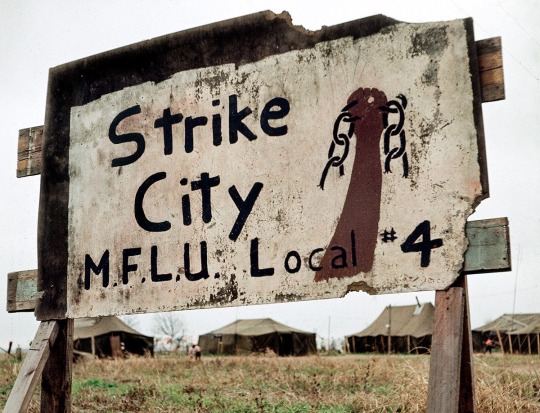
A tin sign demarcated the boundary of Strike City just outside Leland, Mississippi. Photo by Charlie Steiner
In 1965 in the Mississippi Delta, things were not all that different than they had been 100 years earlier. Cotton was still King—and somebody needed to pick it. After the abolition of slavery, much of the labor for the region’s cotton economy was provided by Black sharecroppers, who were not technically enslaved, but operated in much the same way: working the fields of white plantation owners for essentially no profit. To make matters worse, by 1965, mechanized agriculture began to push sharecroppers out of what little employment they had. Many in the Delta had reached their breaking point.
In April of that year, following months of organizing, 45 local farm workers founded the Mississippi Freedom Labor Union. The MFLU’s platform included demands for a minimum wage, eight-hour workdays, medical coverage and an end to plantation work for children under the age of 16, whose educations were severely compromised by the sharecropping system. Within weeks of its founding, strikes under the MFLU banner began to spread across the Delta.
Five miles outside the small town of Leland, Mississippi, a group of Black Tenant Farmers led by John Henry Sylvester voted to go on strike. Sylvester, a tractor driver and mechanic at the A.L. Andrews Plantation, wanted fair treatment and prospects for a better future for his family. “I don’t want my children to grow up dumb like I did,” he told a reporter, with characteristic humility. In fact it was Sylvester’s organizational prowess and vision that gave the strikers direction and resolve. They would need both. The Andrews workers were immediately evicted from their homes. Undeterred, they moved their families to a local building owned by a Baptist Educational Association, but were eventually evicted there as well.
After two months of striking, and now facing homelessness for a second time, the strikers made a bold move. With just 13 donated tents, the strikers bought five acres of land from a local Black Farmer and decided that they would remain there, on strike, for as long as it took. Strike City was born. Frank Smith was a Student Nonviolent Coordinating Committee worker when he went to live with the strikers just outside Leland. “They wanted to stay within eyesight of the plantation,” said Smith, now Executive Director of the African American Civil War Memorial and Museum in Washington, D.C. “They were not scared.”
Life in Strike City was difficult. Not only did the strikers have to deal with one of Missississippi’s coldest winters in history, they also had to endure the periodic gunshots fired by white agitators over their tents at night. Yet the strikers were determined. “We ain’t going out of the state of Mississippi. We gonna stay right here, fighting for what is ours,” one of them told a documentary film team, who captured the strikers’ daily experience in a short film called “Strike City.” “We decided we wouldn’t run,” another assented. “If we run now, we always will be running.”
But the strikers knew that if their city was going to survive, they would need more resources. In an effort to secure federal grants from the federal government’s Office of Economic Opportunity, the strikers, led by Sylvester and Smith, journeyed all the way to Washington D.C. “We’re here because Washington seems to run on a different schedule,” Smith told congressmen, stressing the urgency of the situation and the group’s needs for funds. “We have to get started right away. When you live in a tent and people shoot at you at night and your kids can’t take a bath and your wife has no privacy, a month can be a long time, even a day…Kids can’t grow up in Strike City and have any kind of a chance.” In a symbolic demonstration of their plight, the strikers set up a row of tents across the street from the White House.
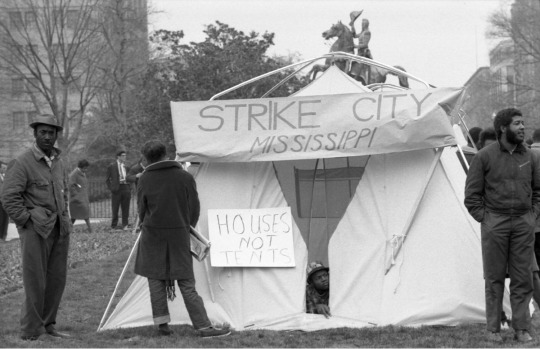
John Henry Sylvester, left, stands outside one of the tents strikers erected in Washington, D.C. in April 1966. Photo by Rowland Sherman
“It was a good, dramatic, in-your-face presentation,” Smith told American Experience, nearly 60 years after the strikers camped out. “It didn’t do much to shake anything out of the Congress of the United States or the President and his Cabinet. But it gave us a feeling that we’d done something to help ourselves.” The protestors returned home empty-handed. Nevertheless, the residents of Strike City had secured enough funds from a Chicago-based organization to begin the construction of permanent brick homes; and to provide local Black children with a literacy program, which was held in a wood-and-cinder-block community center they erected.
The long-term sustainability of Strike City, however, depended on the creation of a self-sufficient economy. Early on, Strike City residents had earned money by handcrafting nativity scenes, but this proved inadequate. Soon, Strike City residents were planning on constructing a brick factory that would provide employment and building material for the settlement’s expansion. But the $25,000 price tag of the project proved to be too much, and with no employment, many strikers began to drift away. Strike City never recovered.
Still, its direct impact was apparent when, in 1965, Mississippi schools reluctantly complied with the 1964 Civil Rights Act by offering a freedom-of-choice period in which children were purportedly allowed to register at any school of their choice. In reality, however, most Black parents were too afraid to send their children to all-white schools—except for the parents living at Strike City who had already radically declared their independence . Once Leland’s public schools were legally open to them, Strike City kids were the first ones to register. Their parents’ determination to give them a better life had already begun to pay dividends.
Smith recalled driving Strike City’s children to their first day of school in the fall of 1970. “I remember when I dropped them off, they jumped out and ran in, and I said, ‘They don't have a clue what they were getting themselves into.’ But you know kids are innocent and they’re always braver than we think they are. And they went in there like it was their schoolhouse. Like they belonged there like everybody else.”
#The Harvest | Integrating Mississippi's Schools | Article#NOVA | PBS#American 🇺🇸 Experience#Mississippi Delta#Cotton | King#Abolition | Slavery#Black Sharecroppers#Mechanized Agriculture#Mississippi Freedom Labor Union (MFLU)#Leland | Mississippi#Black Tenant Farmers#John Henry Sylvester | Truck Driver | Mechanic#A.L. Andrews Plantation#Fair Treatment | Prospects#Baptist Educational Association#Frank Smith | Student | Nonviolent Coordinating Committee#Strike City#Executive Director | African American | Civil War Memorial & Museum | Washington D.C.#Federal Government | Office of Economic Opportunity#Congress of the United States | The President | Cabinet#Brick Homes | Black Children | Literacy Program#Wood-and-Cinder-Block | Community Center
5 notes
·
View notes
Text
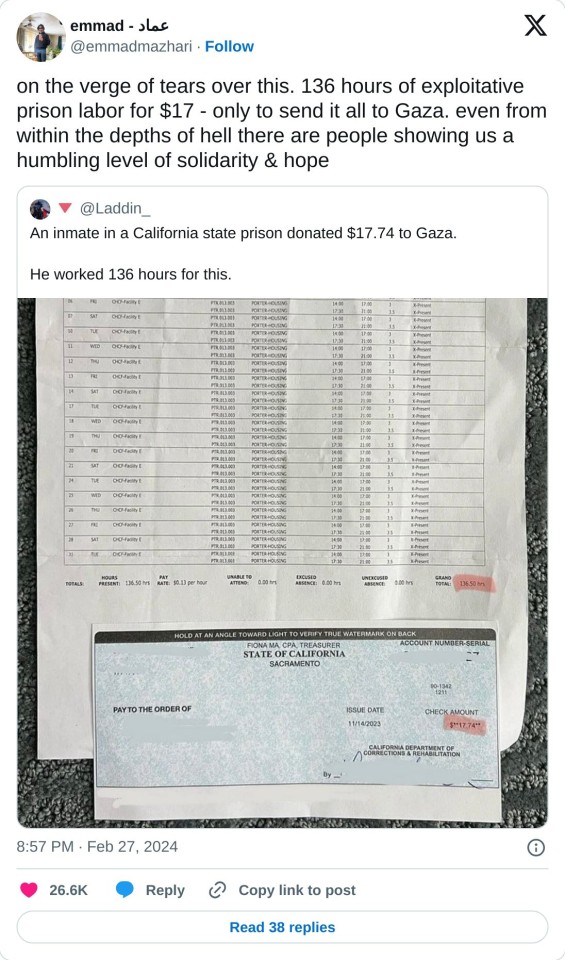
Here's his GoFundMe. It has passed its initial goal but keep sharing and donate if you can to help Hamza.
#yemen#jerusalem#tel aviv#current events#palestine#free palestine#gaza#free gaza#news on gaza#palestine news#news update#war news#war on gaza#slavery#prison abolition
4K notes
·
View notes
Text
UPDATE: turning off reblogs since voting is over for this cycle
this is absolutely not a "go vote or you're evil!" post BUT you should know that if you're registered to vote in Oregon, Alabama, Louisiana, Tennessee, or Vermont you have the opportunity to vote to abolish prison slavery this year, and i think you should strongly consider it.
from the washington post:
"The 13th Amendment of the U.S. Constitution bans slavery or involuntary servitude, except when it is used as punishment for a crime.
If passed, the proposals would wholly abolish slavery in those states, though they would not automatically change protocols on prison labor or inmate pay.
[...] the bills could give lawyers more license to pursue greater rights and higher pay for U.S. prisoners; Dolovich said that paying inmates below the minimum-wage protections set by each state is arguably 'a species of slavery.'
'It’ll be a fight in court. This question will be manifested by lawyers bringing cases on behalf of incarcerated workers,' she said. 'It’s a hopeful sign for me.'"
(Source; warning for more detailed discussion of prison slavery and related cruelty in the article)
so again, if you're able to vote and live in Oregon, Alabama, Louisiana, Tennessee, or Vermont, please consider it. prison abolition will not happen solely via voting it away but if these pass it will certainly be a victory and hopefully a stepping stone for other victories.
#prison abolition#prison labor#slavery#upload#edit: you know what you're right. i'll slap a tag on here for non usamericans#us centric#incarceration#antiblackness
6K notes
·
View notes
Text
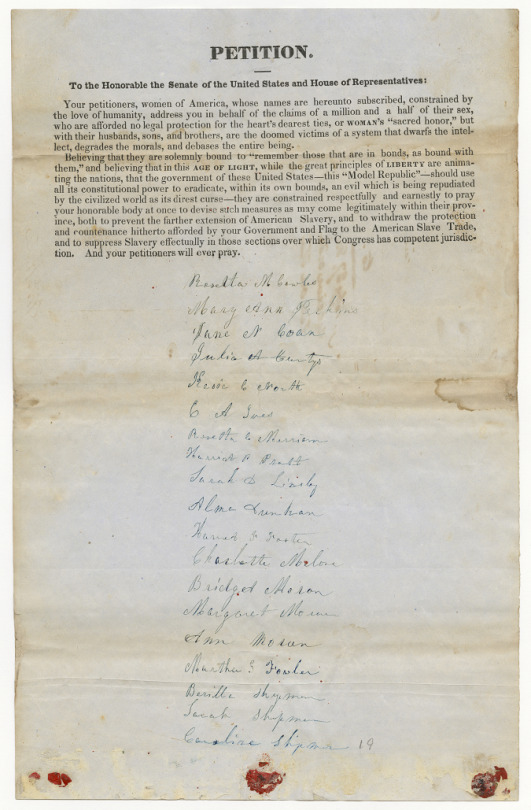
Anti-Slavery Petition from Women of America
Record Group 46: Records of the U.S. SenateSeries: Petitions and Related Documents That Were Presented, Read, or Tabled
PETITION. ____ To the Honorable the Senate of the united States and House of Representatives: Your petitioners, women of America, whose names are hereunto subscribed, constrained by the love of humanity, address you in behalf of the claims of a million and a half of their sex, who are afforded no legal protection for the heart's dearest ties, or WOMAN'S "sacred honor," but with their husbands, sons, and brothers, are the doomed victims of a system that dwarfs the intel- lect, degrades the morals, and debases the entire being. Believing that they are solemnly bound to "remember those that are in bonds, as bound with them," and believing that in this AGE OF LIGHT, while the great principles of LIBERTY are anima- ting the nations, that the government of these United States-this "Model Republic"-should use all its constitutional power to eradicate, within its own bounds, an evil which is being repudiated by the civilized world as its direct curse-they are constrained respectfully and earnestly to pray your honorable body at once to devise such measures as may come legitimately within their prov- ince, both to prevent the farther extension of American Slavery, and to withdraw the protection and countenance hitherto afforded by your Government and Flag to the American Slave Trade, and to suppress Slavery effectually in those sections over which Congress has competent jurisdic- tion. And your petitioners will ever pray. Rosetta M Cowles Mary Ann Perkins Jane N Coan Julia A Curtys K[illegible] C. North G A Sues Rosetta L Merriam Harriat P Pratt Sarah D. Linsley Alma Dunham Harriet F Foster Charlotte Melone Bridget Mason Margaret Moran Ann Moran Martha G Fowler Berille Shipman Sarah Shipmen Caroline Shipmen
103 notes
·
View notes
Text

I bullshit you not.
84 notes
·
View notes
Text
Non-paywall version here.
"When Arley Gill, head of Grenada’s National Reparations Committee, envisioned his work seeking repair for centuries of enslavement on the Caribbean island, one thing was certain: It was going to be a long slog.
But just two years since its founding, the task force is fielding calls from individuals around the world looking to make amends for ancestors who benefited from enslavement in Grenada.
“If you had told us this would be happening, we wouldn’t have believed you,” Mr. Gill says, crediting a burgeoning movement of descendants of enslavers getting wise to their family’s history and taking action.
In Grenada’s case, the momentum began with a public apology made by former BBC journalist Laura Trevelyan and her family in February at a ceremony on the island. They apologized for their forebears’ enslavement of people in Grenada and their enrichment from it, pledging an initial contribution of £100,000 ($130,000) toward education on the island.
“She opened the doors for people to feel comfortable” coming forward, says Mr. Gill.
In April [2023], Ms. Trevelyan and journalist Alex Renton co-founded an organization called Heirs of Slavery. Its eight British members have ancestors who benefited financially from slavery in various ways...
Heirs of Slavery says wealth and privilege trickle down through generations, and that there are possibly millions of Britons whose lives were touched by money generated from enslavement.
The group aims to amplify the voices of those already calling for reparations, like Caribbean governments. And it supports organizations working to tackle the modern-day consequences of slavery, both in the United Kingdom and abroad, from racism to health care inequities. But it’s also setting an example for others, drafting a road map of reparative justice for enslavement – at the individual level...
“Shining a light is always a good idea,” says Mr. Renton, who published a book in 2021 about his family’s ties to slavery, donating the proceeds to a handful of nongovernmental organizations in the Caribbean and England. “You don’t have to feel guilt about it; you can’t change the past,” he says, paraphrasing Sir Geoff Palmer, a Scottish Jamaican scholar. “But we should feel ashamed that up to this point we’ve done nothing about the consequences” of slavery.
Start anywhere
Most Africans trafficked to the Americas and Caribbean during the trans-Atlantic slave trade ended up in the West Indies. The wealth generated there through unpaid, brutal, forced labor funded much of Europe’s Industrial Revolution and bolstered churches, banks, and educational institutions. When slavery was abolished in British territories in 1833, the government took out a loan to compensate enslavers for their lost “property.” The government only finished paying off that debt in 2015.
The family of David Lascelles, the 8th Earl of Harewood, for example, received more than £26,000 from the British government after abolition in compensation for nearly 1,300 lives, while “the enslaved people were given nothing,” Mr. Lascelles says. He joined Heirs of Slavery upon its founding, eager to collaborate with peers doing work he’s been focused on for decades.
“People like us have, historically, kept quiet about what our ancestors did. We believe the time has come to face up to what happened, to acknowledge the ongoing repercussions of this human tragedy, and support the existing movements to discuss repair and reconciliation,” reads the group’s webpage.
For Ms. Trevelyan, that meant a very public apology – and resigning from journalism to dedicate herself to activism...
For Mr. Lascelles, a second cousin of King Charles, making repairs included in 2014 handing over digitized copies of slavery-related documents discovered in the basement of the Downton Abbey-esque Harewood House to the National Archives in Barbados, where much of his family’s wealth originated during enslavement.
“What can we do that is actually useful and wanted – not to solve our own conscience?” he says he asks himself...
“Listen and learn”
...The group is planning a conference this fall that will bring together families that benefited from the trans-Atlantic slave trade along with representatives from Caribbean governments and Black Europeans advocating for reparations. In the meantime, members are meeting with local advocacy groups to better understand what they want – and how Heirs of Slavery might assist.
At a recent meeting, “there was one man who said he wanted to hear what we had to say, but said he saw us as a distraction. And I understand that,” says Mr. Renton. “Maximum humility is necessary on our part. We are here to listen and learn, not try to take the lead and be the boss.”
Mr. Renton’s family has made donations to youth development and educational organizations, but he doesn’t see it as compensation. “I see this as work of repair. If I sold everything I own, I couldn’t begin to compensate for the lives my ancestors destroyed,” he says."
-via The Christian Science Monitor, August 1, 2023
Note: I know the source name probably inspires skepticism for a lot of people (fairly), but they're actually considered a very reliable and credible publication in both accuracy and lack of bias.
#slavery#reparations#antiblackness#racism#colonialism#united kingdom#uk#granada#caribbean#social justice#ancestry#black history#black lives matter#reparative justice#enslavement#abolition#systemic racism#good news#hope
242 notes
·
View notes
Video
Cop city in Atlanta
https://www.transitionus.org
https://defendtheatlantaforest.org/
http://www.savetheoldatlantaprisonfarm.org/
#tiktok#cop city atlanta#cop city#atlanta#Georgia#USA#police violence#police brutality#police abolition#climate crisis#floods#water pollution#climate change#inequality#income inequality#wealth inequality#chattel slavery#prison labor#prison abolition#prison#forest preserve#forests#collective action#protests
348 notes
·
View notes
Text
Today is the 164th anniversary of abolitionist martyr John Brown's raid on Harper's Ferry!
"His soul is marching on!"
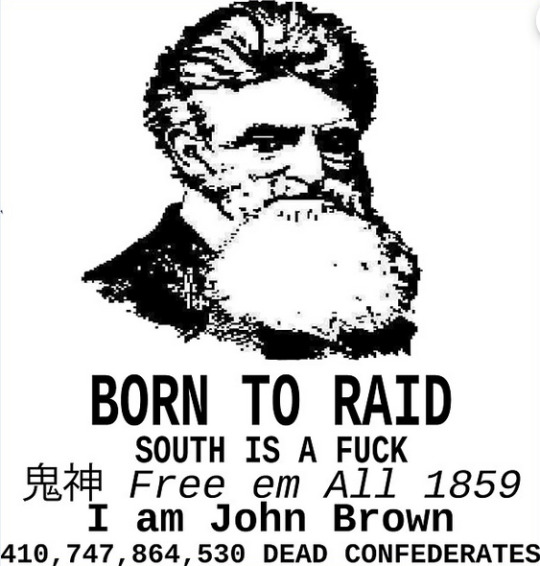
106 notes
·
View notes
Text

The American English expression "fried chicken" was first recorded in the 1830s, and frequently appears in American cookbooks of the 1860s and 1870s. The origin of fried chicken in the southern states of America has been traced to precedents in Scottish and West African cuisine. Scottish fried chicken was cooked in fat, and West African fried chicken added different seasonings,and was battered and cooked in palm oil. Scottish frying techniques and African seasoning techniques were used in the American South by enslaved Africans

Fried chicken provided some means of an independent economy for enslaved and segregated African-American women, who became noted sellers of poultry (live or cooked) as early as the 1730s.Because of the expensive nature of the ingredients, it was, despite popular belief, a rare dish in the African-American community reserved (as in Africa) for special occasions.When it was introduced to the American South, fried chicken became a common staple. Later, as the slave trade led to Africans being brought to work on southern plantations, the enslaved people who became cooks incorporated seasonings and spices that were absent in traditional Scottish cuisine, enriching the flavor. Since most enslaved people were unable to raise expensive meats, but were generally allowed to keep chickens, frying chicken on special occasions continued in the African-American communities of the South, especially in the periods of segregationthat closed off most restaurants to the African population

American-style fried chicken gradually passed into everyday use as a general Southern dish, especially after the abolition of slavery, and its popularity spread. Since fried chicken traveled well in hot weather before refrigeration was commonplace and industry growth reduced its cost, it gained further favor across the South. Fried chicken continues to be among this region's top choices for "Sunday dinner". Holidays such as Independence Day and other gatherings often feature this dish. During the 20th century, chain restaurants focused on fried chicken began among the boom in the fast food industry. Brands such as Kentucky Fried Chicken (KFC) and Popeyes expanded in the United States and across the world.

#african#afrakan#kemetic dreams#africans#brownskin#afrakans#brown skin#african culture#african food#african cuisine#fried chicken'cjicken#doro#kentucky fried chicken#popeyes#abolition of slavery#south#united states#africa#scottish#1730s#slave trade
81 notes
·
View notes
Text
By W.E.B. Du Bois
How the facts of American history have in the last half century been falsified because the nation was ashamed. What are American children taught today about Reconstruction? . . . they would in all probability complete their education without any idea of the part which the black race has played in America; of the tremendous moral problem of abolition; of the cause and meaning of the Civil War and the relation which Reconstruction had to democratic government and the labor movement today . . .
#Juneteenth#Reconstruction#Black history#WEB Dubois#slavery#abolition#propaganda#white supremacy#capitalism#civil war#Black liberation#workers#solidarity#education#schools#struggle la lucha
81 notes
·
View notes
Text
Netflix said "hey does anyone want to watch soft porn about George iii" and didn't wait for an answer
#they're like here's a fit guy's arse#yes he is playing the guy that caused the american revolution#but now he's hot#like girlies truly#bridgerton#queen charlotte#this bitch delayed the abolition if the slave trade for 20 years#and was staunchly against prime minister pitt in the pro slavery side of parliament#but now he's fucking a black woman snd ending racism
129 notes
·
View notes
Text
[T]he Dutch Republic, like its successor the Kingdom of the Netherlands, [...] throughout the early modern period had an advanced maritime [trading, exports] and (financial) service [banking, insurance] sector. Moreover, Dutch involvement in Atlantic slavery stretched over two and a half centuries. [...] Carefully estimating the scope of all the activities involved in moving, processing and retailing the goods derived from the forced labour performed by the enslaved in the Atlantic world [...] [shows] more clearly in what ways the gains from slavery percolated through the Dutch economy. [...] [This web] connected them [...] to the enslaved in Suriname and other Dutch colonies, as well as in non-Dutch colonies such as Saint Domingue [Haiti], which was one of the main suppliers of slave-produced goods to the Dutch economy until the enslaved revolted in 1791 and brought an end to the trade. [...] A significant part of the eighteenth-century Dutch elite was actively engaged in financing, insuring, organising and enabling the slave system, and drew much wealth from it. [...] [A] staggering 19% (expressed in value) of the Dutch Republic's trade in 1770 consisted of Atlantic slave-produced goods such as sugar, coffee, or indigo [...].
---
One point that deserves considerable emphasis is that [this slave-based Dutch wealth] [...] did not just depend on the increasing output of the Dutch Atlantic slave colonies. By 1770, the Dutch imported over fl.8 million worth of sugar and coffee from French ports. [...] [T]hese [...] routes successfully linked the Dutch trade sector to the massive expansion of slavery in Saint Domingue [the French colony of Haiti], which continued until the early 1790s when the revolution of the enslaved on the French part of that island ended slavery.
Before that time, Dutch sugar mills processed tens of millions of pounds of sugar from the French Caribbean, which were then exported over the Rhine and through the Sound to the German and Eastern European ‘slavery hinterlands’.
---
Coffee and indigo flowed through the Dutch Republic via the same trans-imperial routes, while the Dutch also imported tobacco produced by slaves in the British colonies, [and] gold and tobacco produced [by slaves] in Brazil [...]. The value of all the different components of slave-based trade combined amounted to a sum of fl.57.3 million, more than 23% of all the Dutch trade in 1770. [...] However, trade statistics alone cannot answer the question about the weight of this sector within the economy. [...] 1770 was a peak year for the issuing of new plantation loans [...] [T]he main processing industry that was fully based on slave-produced goods was the Holland-based sugar industry [...]. It has been estimated that in 1770 Amsterdam alone housed 110 refineries, out of a total of 150 refineries in the province of Holland. These processed approximately 50 million pounds of raw sugar per year, employing over 4,000 workers. [...] [I]n the four decades from 1738 to 1779, the slave-based contribution to GDP alone grew by fl.20.5 million, thus contributing almost 40% of all growth generated in the economy of Holland in this period. [...]
---
These [slave-based Dutch commodity] chains ran from [the plantation itself, through maritime trade, through commodity processing sites like sugar refineries, through export of these goods] [...] and from there to European metropoles and hinterlands that in the eighteenth century became mass consumers of slave-produced goods such as sugar and coffee. These chains tied the Dutch economy to slave-based production in Suriname and other Dutch colonies, but also to the plantation complexes of other European powers, most crucially the French in Saint Domingue [Haiti], as the Dutch became major importers and processers of French coffee and sugar that they then redistributed to Northern and Central Europe. [...]
The explosive growth of production on slave plantations in the Dutch Guianas, combined with the international boom in coffee and sugar consumption, ensured that consistently high proportions (19% in 1770) of commodities entering and exiting Dutch harbors were produced on Atlantic slave plantations. [...] The Dutch economy profited from this Atlantic boom both as direct supplier of slave-produced goods [from slave plantations in the Dutch Guianas, from Dutch processing of sugar from slave plantations in French Haiti] and as intermediary [physically exporting sugar and coffee] between the Atlantic slave complexes of other European powers and the Northern and Central European hinterland.
---
Text above by: Pepijn Brandon and Ulbe Bosma. "Slavery and the Dutch economy, 1750-1800". Slavery & Abolition Volume 42, Issue 1. 2021. [Text within brackets added by me for clarity. Bold emphasis and some paragraph breaks/contractions added by me. Presented here for commentary, teaching, criticism purposes.]
#abolition#these authors lead by pointing out there is general lack of discussion on which metrics or data to use to demonstrate#extent of slaverys contribution to dutch metropolitan wealth when compared to extensive research#on how british slavery profits established infrastructure textiles banking and industrialisation at home domestically in england#so that rather than only considering direct blatant dutch slavery in guiana caribbean etc must also look at metropolitan business in europe#in this same issue another similar article looks at specifically dutch exporting of slave based coffee#and the previously unheralded importance of the dutch export businesses to establishing coffee mass consumption in europe#via shipment to germany#which ties the expansion of french haiti slavery to dutch businesses acting as intermediary by popularizing coffee in europe#which invokes the concept mentioned here as slavery hinterlands#and this just atlantic lets not forget dutch wealth from east india company and cinnamon and srilanka etc#and then in following decades the immense dutch wealth and power in java
24 notes
·
View notes
Text
"so much for the tolerant left."
white people reading about John Brown's assault on Harpers Ferry in October, 1859.
167 notes
·
View notes
Text
Antisemitism is an inherent and essential part of Nazi ideology. Nazis target other demographics as well, but the antisemitism is a main, essential component. If someone isn't antisemitic then they're not a Nazi. If an ideology doesn't include antisemitism then it isn't Nazi ideology. There is literally no such thing as Nazi ideology that doesn't revolve around antisemitism. You can not separate antisemitism from Nazism, they go hand in hand. Someone who is queerphobic but not antisemitic is not a Nazi. Someone who is ableist but not antisemitic is not a Nazi. Someone who hates other ethnic or cultural groups but not Jewish people is not a Nazi. There's no such thing as a Nazi that doesn't hate Jewish people. You are helping no one by throwing the word around for any and all forms of fascism or discrimination, and you are harming people by acting like antisemitism isn't an essential part of Nazism.
#hey it's not exactly the same but the kkk target other demographics other than black people#but they formed specifically in response to the abolition of slavery and the freeing of black slaves#and the anti-black racism has always been a primary part of their ideology#imagine going up to black americans and screaming at them that other people are hated by the kkk too#or just trying to act like the anti-black racism isn't important#why would you do that right?#so why would you do it to jewish people?#or people being allies
19 notes
·
View notes
Text

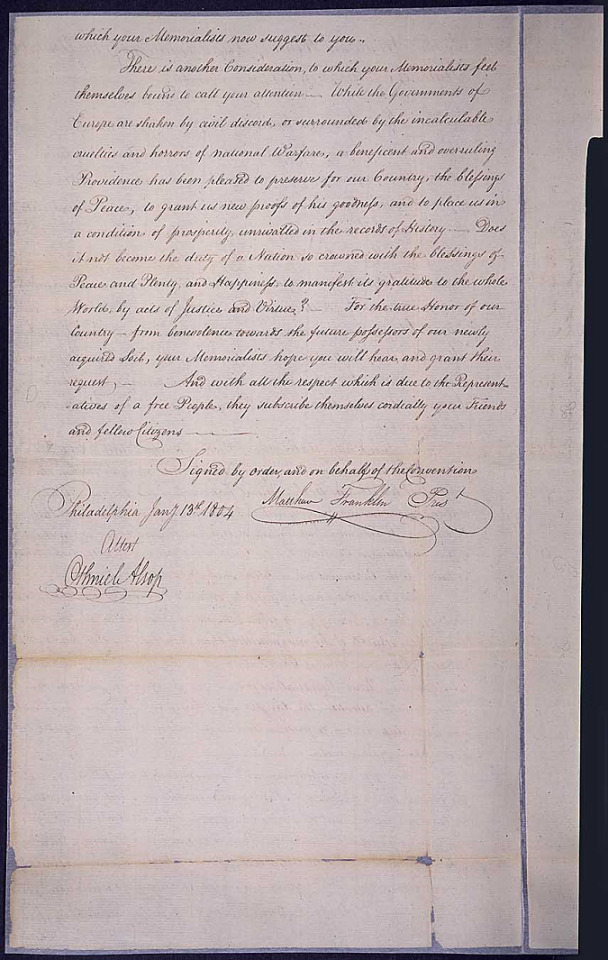
Memorial of the American Convention for Promoting the Abolition of Slavery, signed at Philadelphia, praying that Congress will prohibit the importation of slaves into the Territory of Louisiana, lately ceded to the United States
Record Group 233: Records of the U.S. House of RepresentativesSeries: Records of Early House Select CommitteesFile Unit: Petitions and Memorials, Resolutions of State Legislatures, and Related Documents Which Were Referred to Various Select Committees during the 8th Congress
To the Senate and House of Representatives of the United States of America in Congress assembled - The American Convention for promoting the abolition of Slavery and improving the condition of the African Race beg leave respectfully to propose for your consideration, the utility and propriety of passing such Laws as shall prohibit the importation of Slaves into the Territory of Louisiana lately ceded to the United States. Your Memorialists feel themselves deeply impressed with this important subject, and they deem it their duty to solicit most earnestly your serious attention to the proposition. They believe that wisdom and sound Policy are so intimately united by their Eternal Parent that Man cannot separate them with impunity. If wisdom urge the performance of any particular Act, if it command the formation and establishment of any specific Law, the soundest Policy will be evinced by obedience to that injunction. True Virtue, the Offering of Wisdom, teaches Man to love his fellow Man, and enjoins him to perform all that may be within the compass of his Abilities, for the general happiness of his Species. When national Governments comply with this benevolent and sublime Law, they become the Providential Instruments of national blessings, but when they oppose or disregard its dictates, their Constituents must necessarily feel, sooner or later, all the Calamities which follow such Opposition or Neglect. Our Ancestors have, unhappily, entailed on some of our States, the evils of Slavery. Many of our fellow Citizens in those States, we believe are mournfully sensible of the magnitude of their [Burthen?], but they know and feel that Man may commit Error with more facility than he can eradicate its consequences. Your Memorialists entreat you to reflect on to consider with impartial attention, the dangers and difficulties before you, and beseech you with deep concern, to foreserve the Country, whose regulations depend on your Wisdom, from similar calamities. They also respectfully suggest to you, that while the Constitution of the United States declares all Men equally entitled to Liberty, they cannot conceive our Government as acting consistently with its declarations, if it shall, in any instance, authorize Man to enslave unoffending Man. In compliance with law distinguishing [illegible] of [illegible] national [illegible] a former Congress judged it expedient to introduce among its regulations for the government of the Northwester Territory, a provision resembling that 206 whichwhich your Memorialists now suggest to you. There is another Consideration to which your Memorialists feel themselves bound to call to your attention. While the Governments of Europe are shaken by civil discord, or surrounded by the incalculable cruelties and horrors of national Warfare, a beneficent and overruling Providence has been pleased to preserve for our Country, the blessings of Peace, to grant us new proofs of his goodness, and to place us in a condition of prosperity unrivalled in the records of History. Does it not become the duty of a Nation so crowned with the blessings of Peace and Plenty and Happiness to manifest its gratitude to the whole World by acts of Justice and Virtue? For the true Honor of our Country - from benevolence towards the future possessors of our newly acquired Soil, your Memorialists hope you will hear and grant their request. And with all the respect which is due to the Representatives of a free People, they subscribe themselves cordially your Friends and fellow Citizens. Signed by order, and on behalf of the Convention Matthew Franklin Pres Philadelphia Jany 13th 1804 Attest [illegible] Alsop
48 notes
·
View notes
Text

'devouring the devout' by mana nagai (oct. 6, 2023)
a collage based on toni morrison's beloved | ig: themaddiebee
#writer#writing#art#collage#edit#moodboard#quote#quotes#aesthetic#black women#black writers#toni morrison#beloved#sethe#feminism#colonialism#slavery#abolition#my art#mine#themaddiebee#music#spotify wrapped#spotify#mitski#cop car#Spotify
20 notes
·
View notes